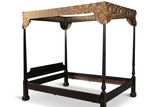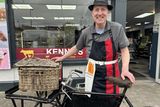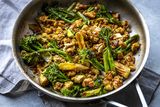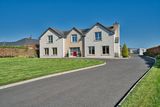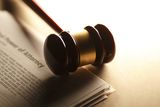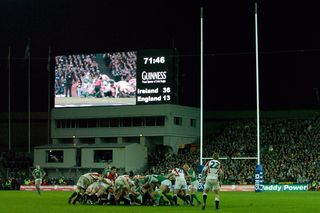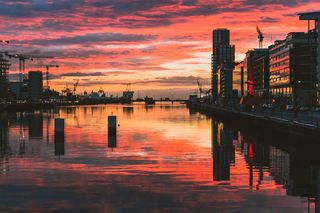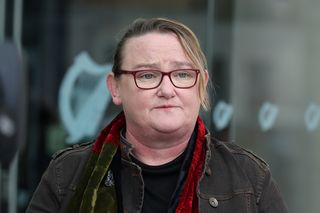Rebellion started with a game
An online book provides a unique perspective of the Easter Rising by someone who took part
History: Paddy Holahan wrote up his grandfather's history career. Photo: Damien Eagers.
The most striking aspect of a faded photograph of Na Fianna Éireann from its 1913 Ard Fheis is the cherubic faces of children sitting cross-legged in the front row. There's something incongruous in the sight of boys as young as 10 or 11 in military-style uniform flanked by teenagers and adults also in full regalia.
At the centre of the picture is Constance Markievicz, who founded the organisation with Bulmer Hobson in 1909. Also present is one 15-year-old 1st Lieutenant Patrick Hugh Holahan, a boy whose father had served in the British forces yet, at his swearing-in ceremony, Paddy vowed, as did all Na Fianna Éireann boys, "I will never join the British army".
In his recollections written at the age of 25, he described the Fianna as being "bound together by a simple promise - to work for the independence of Ireland".
But if one man's patriotism is another's brainwashing, Paddy's grandson and namesake today has no illusions about the purpose of the movement.
"Baden-Powell's Boy Scouts indoctrinated empire kids in preparation for joining the British army and Na Fianna Éireann was an antidote to that," he says. "It was set up to feed young men into the Irish forces, and by the time the Rising came about, they were so well drilled, they were well up for it."
They'd already had plenty of practice. In 1914 these boys-to-men, now acting as the Youth Wing of the Irish Volunteers, helped unload and secure almost 1,000 rifles and 30,000 rounds of ammunition from the yacht Asgard as part of the Howth Gun Running operation.
Two years later, on Easter Monday 1916, Paddy was selected as one of a group of Fianna to attack the Magazine Fort in the Phoenix Park to procure weapons, and then blow it up to signal the start of the rebellion. It started with a game of football. As ordered, the players moved closer to the main gate as the game progressed, then kicked the ball over the gate. When one boy asked permission to get the ball back, the sentry at the gate thought it an innocent request and let him in, but once he opened the gate, the Fianna rushed the sentries and captured them.
They packed rifles and ammunition into a hackney, released their prisoners and while the building didn't explode, they set it on fire, which took days to extinguish. Mission accomplished, they set off for Blackhall Place, and it wasn't just their bicycles that were pumped; the boys were now hungrier than ever for a taste of battle.
Under the command of Ned Daly, Paddy fought in the Four Courts garrison where on his first night he was posted on the roof of a house in North Brunswick Street. "I thought every chimney pot was a soldier and I shot at them during the night," he wrote.
Every night that week, when the city was thrown into blackout, he described "prowling about dark, deserted rooms", with nerves on edge and imagination exaggerating things to the point where, "I entered one room, and was startled to see an armed man confronting me. I challenged and, receiving no reply, fired. The crash of breaking glass brought me to my senses. I had fired at my own reflection in a wardrobe mirror.
"From dawn on Friday until the end, the attack all over the city became intense. Heavy firing was heard from all directions… When night came, an armoured car appeared and its 15 occupants jumped out and proceeded to fire into every house along North King Street. The few occupants lay face down in the rooms while bullets pounded the walls over them.
"One soldier, endeavouring to club in a door with the butt end of his rifle, killed his comrade when the rifle went off… It was pitch dark and the only guide to a target was the flash of a rifle. A scream or a groan announced when a bullet had reached its mark."
Such graphic accounts inspired Paddy Hugh's grandson Paddy (Jnr) to chart his grandfather's military career for family posterity in an online book which provides a unique perspective of the Easter Rising through the eyes of someone who took part in it.
"The children of those involved in the Rising will be gone in another 20 years," says Paddy (Jnr). "The link will be broken. That's why it's so important we hear their stories while we can. They're personal, family stories, but they're also of great worth as records of our military history. They're real and honest, and I believe they're important on many levels, human, historical and political.
"Grandad was aged 18-25 between 1916 and 1923, so his growing-up years coincided with the birth of the country."
Paddy Hugh went on to command the 1st Battalion of the Dublin Brigade during the Battle of Dublin in the Civil War.
"The Civil War will be very hard to commemorate," says Paddy (Jnr). "My grandparents were staunch republicans, while Granny's brother was pro-Treaty and, as was echoed throughout the land, the family was split."
On his release from Frongoch prison in Wales, Paddy Hugh became a trade unionist.
He rejoined the army during the Emergency in 1939, when he set up a reserve force with Old IRA men, both pro- and anti-Treaty.
"It was very symbolic and helped to heal old wounds," says Paddy (Jnr).
To view a copy of his book, Patrick Hugh Holahan, Volume One, visit: http://bit.ly/1Ongptb
Join the Irish Independent WhatsApp channel
Stay up to date with all the latest news
